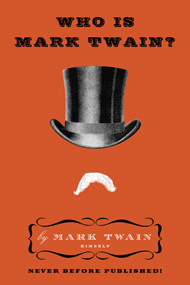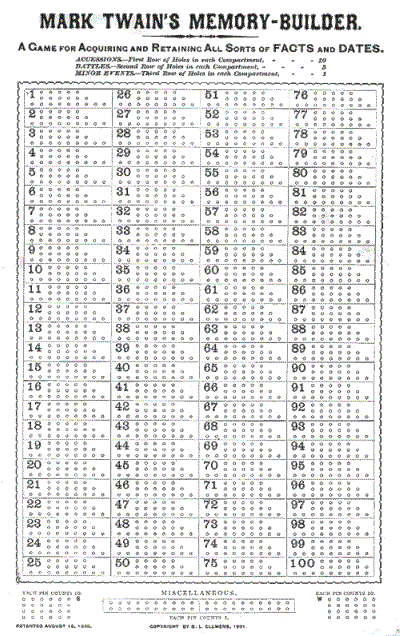 As a bona fide Twain obsessive, I am of course almost unnaturally excited about Who Is Mark Twain?, a forthcoming compilation of some of the Huck Finn author’s previously unpublished work.
As a bona fide Twain obsessive, I am of course almost unnaturally excited about Who Is Mark Twain?, a forthcoming compilation of some of the Huck Finn author’s previously unpublished work.
Last December The New Yorker offered a preview: “The Privilege of the Grave,” which sheds light on Twain’s thoughts about death and posthumous publication.
Now B&N Review provides another excerpt, Whenever I Am about to Publish a Book. Here the author claims that, before committing fully to publishing a work, he always read the manuscript “to a private group of friends, composed as follows”:
1. Man and woman with no sense of humor.
2. Man and woman with medium sense of humor.
3. Man and woman with prodigious sense of humor.
4. An intensely practical person.
5. A sentimental person.
6. Person who must have a moral in, and a purpose.
7. Hypercritical person — natural flaw-picker and fault-finder.
8. Enthusiast — person who enjoys anything and everything, almost.
9. Person who watches the others, and applauds or condemns with the majority.
10. Half a dozen bright young girls and boys, unclassified.
11. Person who relishes slang and familiar flippancy.
12. Person who detests them.
13. Person of evenly balanced judicial mind.
14. Man who always goes to sleep.
These people accurately represent the general public. Their verdict is the sure forecast of the verdict of the general public. There is not a person among them whose opinion is not valuable to me; but the man whom I most depend upon — the man whom I watch with the deepest solicitude — the man who does most toward deciding me as to whether I shall publish the book or burn it, is the man who always goes to sleep.
The rest is here.
Twain was preoccupied not only with predicting the public’s reaction to his work (and setting aside the most inflammatory stuff for publication after his death), but with preserving memory.
Pictured below is a dubious game of his creation. According to one critic, it looked “like a cross between an income tax form and a table of logarithms.”
